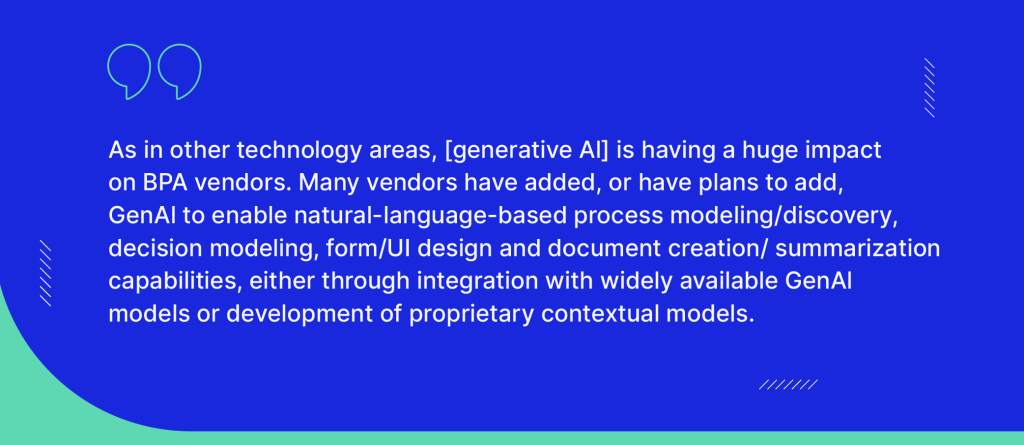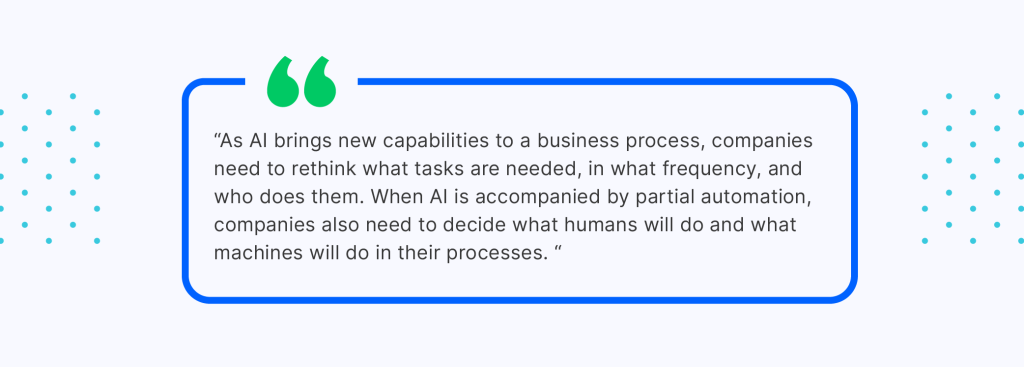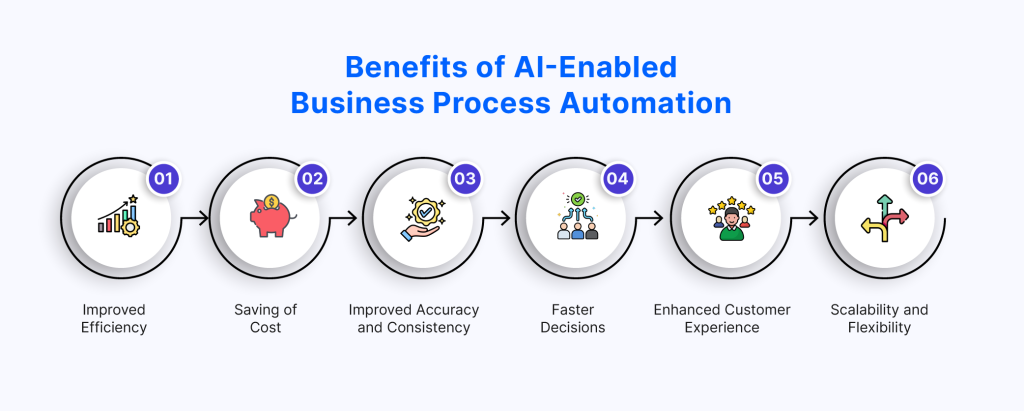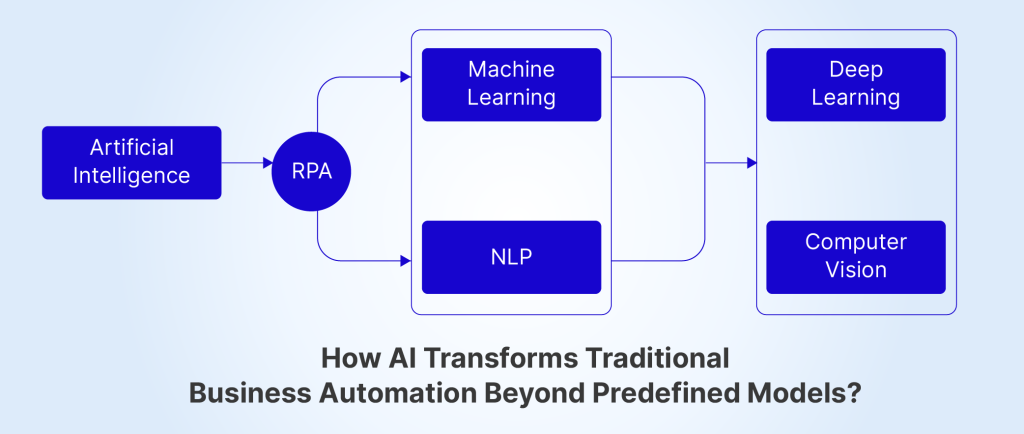When teams operate independently, it creates communication gaps that can lead to disorder. In contrast, when teams collaborate, they tend to be more efficient.
Did you know that artificial intelligence (AI) could reduce operating costs by 20–40% and boost corporate productivity by up to 30%?
AI Business process automation is evolving with the integration of artificial intelligence (AI), revolutionizing decision-making with unprecedented precision and efficiency. Businesses from all sectors are using AI-powered solutions to streamline processes, lower human error, and make data-driven choices. Routine chores can be automated to free up important human resources for employees to work on more strategic, innovative projects that support company growth and innovation.
The application of artificial intelligence technology to automate and improve a range of business operations is known as AI business process automation. Organizations may increase productivity, save operating costs, and automate monotonous processes by utilizing AI algorithms and machine learning.
Applications for this technology include supply chain management, customer service, finance, and human resources, among other industries and functional domains.
Gartner® writes this in the Market Guide for Business Process Automation Tools:

The application of intelligent algorithms and machine learning approaches is how AI is changing business approach and solving problems in the field of artificial intelligence (AI) business process automation. Intelligent systems improve in outcome prediction, operational efficiency, and customer experience as a result of learning from data. This capacity gives a competitive edge in a digital economy that is changing quickly in addition to speeding up performance.
Furthermore, the use of AI automation in corporate processes is a long-term strategic change rather than merely a passing fad. Businesses are seeing a productivity and efficiency revolution as a result of incorporating AI into their fundamental operations.
Artificial Intelligence (AI) is revolutionizing business AI process automation by enabling organizations to streamline operations, improve efficiency, and drive innovation. Here’s a breakdown of how AI is transforming various aspects of business process automation:
AI-powered tools can extract and process data from various sources, including structured and unstructured data such as emails, documents, images, and videos. Natural Language Processing (NLP) and Optical Character Recognition (OCR) technologies enable the interpretation of text and images, allowing businesses to automate data entry tasks and extract valuable insights from large datasets.
AI algorithms can analyze historical data to identify patterns, trends, and correlations, enabling organizations to make informed predictions about future outcomes. Predictive analytics helps businesses optimize resource allocation, forecast demand, minimize risks, and identify opportunities for growth.
Machine learning, algorithms, natural language processing, and cognitive automation are some of the technologies that are essential to AI in business operations. These technologies work together to automate processes and enable data-driven decision-making. As evidenced by a number of use cases, AI and AI process automation work well together to turn businesses into more productive organizations by letting them take use of AI’s analytical prowess and RPA’s effectiveness in job execution. Furthermore, data analytics is essential in this environment because it creates the foundation for AI to find the best answers and advance business process management. When you want to integrate more AI into your processes, take into account this advice from three Harvard Business Review experts. They advise businesses to look at entire processes to see how they might be enhanced, rather than merely automating tasks.

AI Automation Implementation is a systematic approach to integrating the technologies of Artificial Intelligence into the current processes in order to smoothen operations, increase efficiency, and bring innovation. A brief overview of these steps is given below.
The very first step, therefore, for implementing AI for automation at the workplace shall be to identify opportunities where AI may be added within the business process. First up will be a comprehensive assessment of all existing workflows, the pain areas, and areas of improvement across various departments, e.g., customer service, sales, marketing, finance, and operations.
The AI automation initiatives’ objectives and goals should be defined clearly and should align with general business objectives, focusing on adding value to key performance indicators (KPI) that are observed to improve. These KPIs are cost savings, increases in productivity, customer satisfaction, and revenue growth.
Data is to artificial intelligence and automation systems what fuel is to vehicles. The business houses have to collect, clean, and prepare relevant data originating internally and externally to be able to train AI models fruitfully. It might combine data from an enterprise system with IoT devices, social media, customer interactions, or whatever other sources there are into a comprehensive data set for the intended analysis.
Companies would need to select the appropriate AI technologies and tools, or the most fitting choice of automation, based on their company’s needs and goals.
It may comprise, but is not limited to, machine learning algorithms, natural language processing (NLP) models, computer vision systems, robotic process automation (RPA) software, or other customized AI-based solutions from top artificial intelligence companies according to organizational requirements.
After AI technologies are identified, this is the stage where businesses have to develop and train AI models using the dataset prepared earlier. It includes, among others, the selection of the appropriate algorithms, parameter fine-tuning, testing, and rigorous validation of model performance. The whole process of AI might involve iterative refinement to perfect model accuracy, scalability, and robustness.
The AI automation for business systems should be capable of integrating smoothly with existing business systems, applications, and workflows for operational purposes. Most of these integrations would often involve data scientists and both AI and machine learning engineers, along with IT teams and at times stakeholders from other departments to put in place AI solutions that will work in the production environment without causing many disruptions.
Post-de deployment, the organization needs to monitor continually if its systems of artificial intelligence automation are running as planned and benefits realization. This, of course, means monitoring key metrics, analyzing data for performance, and identifying optimization and refinement opportunities that will increase efficiency and effectiveness over time. Training and Change Management: The realization of successful AI automation implementation starts with sensitizing and training the employees to effortlessly and efficiently adopt new processes, tools, and workflows to accrue the maximum benefits that AI technologies can bring to their workspace.
AI-enabled business process automation offers unparalleled efficiency, accuracy, and cost savings. By streamlining workflows, reducing errors, and enabling faster decision-making, AI automation boosts productivity and enhances customer experiences. According to mckinsey, AI has the potential to improve business performance; its influence on operations is projected to be between $10 trillion and $15 trillion.

The following are some benefits that an organization can derive from AI-driven automation of business processes in different industries:

AI business automation reduces human intervention in repetitive and time-consuming tasks, enabling employees to shift their focus to more strategic activities. Increased productivity from doing the work automatically and enhanced operational efficiencies through carrying out routine processes are made by the organizations.
This also means that automation reduces the need for human intervention and hence a lot of manual labor, which over some time has enormous cost savings. Automation, in other words, allows companies to eliminate human errors from time-consuming, labor-intensive tasks. Each of these works together to bring down operational costs and thereby have an effect on the profit margins.
The AI-fueled automation ensures that the associated task execution is much improved with respect to accuracy and consistency compared to manually processed procedures. The high level of errors and variability that arise from human factors can then be done away with, enabling organizations to uphold quality while ensuring that they offer the best outcomes in a more consistent manner.
AI algorithms will be in a position to process real-time big data; thus, decisions arrived at will be fast and informed. AI automation, through actionable insights and recommendations, speeds up the processes that make decisions, hence keeping up with markets moving at a very fast pace.
the online experience becomes fully personalized and responsive at every touchpoint through AI business process automation. Some of the tools that assist in understanding the needs and being forward in this line include chatbots, virtual assistants, and predictive analytics, among others. They improve consumer satisfaction and loyalty by helping in understanding the needs and being forward in this line.
AI automation solutions can be easily scaled up and down, flexible enough to meet growing workloads, as per your business requirement. From the management of gigantic data volumes to the complexity of workflow and the fluctuations in demand of time, AI has something in store in each and every field of organizational growth, and it’s nothing else but the scalability and flexibility.
AI automation greatly assists in the improved handling of risk management and compliance. Organizations can reduce the risk of fraud and, on the other hand, execute adherence to regulatory requirements more effectively through real-time monitoring of patterns of transactions and data analysis.
AI automation innovation nurtures opportunities that organizations get a chance to venture out, experiment with emerging technologies, and differentiate the products or services in the market. Automating repetitive activities, in turn, serves to free the resources within an organization, thus affording them time to concentrate on the innovation of products, development, and strategic initiative that empowers competitive advantage.
AI business automation empowers the employee by removing tasks that are mundane and focusing on meaningful and challenging tasks. In this sort of method, basic and usual tasks’ automation not only can improve employees’ satisfaction but also can avoid burnouts and even promote employees’ retention in the organization.
AI Automation derives valuable insight from data to inform strategic decisions and business growth. In the process, optimization of all the processes is created in new revenue streams through the analysis of patterns, trends, and correlations in the data that discover organizational opportunities.
Similarly, AI-enabled business process automation finds its applications across industries and functional areas. Few of the real-life examples are as follows:
Many organizations have resorted to the use of chatbots or virtual assistants in the course of handling customer service. They provide answers to any questions customers may have, offer support, and may also guide the customer on the right product to buy from their requests. Examples include banks that have applied chatbots to enhance the way their customers are able to get any of their account inquiries, transaction history, or recommendations for products.
The departments of finance and accounting highly depend on AI automation, for they get the services of AI process automation in invoice processing, management of expenses, and financial reporting, among others. For example, an AI algorithm extracts needed data from invoices, validates the expenses, and then categorizes transactions with far less manpower requirements and therefore much better accuracy.
AI-based automation by HR departments sifts through resumes and discovers the best candidates. HR departments give employees the ability to breeze through the onboarding process. AI-powered recruiting platforms automatically scrub resumes, evaluate the qualification of candidates, and pair people with job openings to increase the speed of hiring and lower the time it takes to fill open positions.
AI automation optimizes the processes of the supply chain for demand forecasting, inventory management, and operations logistics. As such, a retailer using AI algorithms in the prediction of demand ensures inventory levels and planning for the distribution routes are well optimized, hence proving the efficiency of operations with minimal stockouts.
In the application of AI automation, equipment or equipment performance is monitored, defect detection is performed, and production schedules are optimally achieved. For instance, AI-powered robots in automotive manufacturing conduct welding, painting, and assembling for productivity and good quality.
Another similar industry is healthcare, in which AI automation is applied in analyzing medical images and diagnosing patients, as well as medication management. For example, the use of AI algorithms in the analysis of medical images could ensure more accurate detection of anomaly cases, hence getting a speed-up for diagnosticians’ work related to diseases such as cancer.
The use of AI automation in marketing and sales improves the overall process via customer data analytics and predicts customer behavior to ensure personalized marketing campaigns. E-commerce companies are using AI algorithms to recommend the purchase of products according to the preference of customers, their browsing history, and even purchase patterns to bring in improved sales and conversion rates.
The use of AI in legal departments and law firms is one of the categories with very substantial benefits. AI-powered legal tech is able to help lawyers save much more time and be much more precise in contract review because it shows how different parts of a contract go together and identifies potential risks or areas of discrepancies for such a contract.
The use of AI automation by telecommunication companies is in the management of networks, customer service, and predictive maintenance. This seeks through AI algorithms in the analysis of the data on equipment performance, thus predicting equipment failure, and further optimizing the use of network resources to assure reliable connectivity and ultimately fulfill customer satisfaction.
Teaching and learning institutions apply AI automation use cases in the entire learning process: personalized tutoring for every student, assessment of students, and even in content creation in education. The use of the AI adaptive learning platform sees AI algorithms follow students’ performance data and identify where exactly the gaps are in learning; it then proceeds to trigger individualized learning experiences that are developed to fit the needs and preferences of each user.
AI transforms traditional business automation beyond predefined models by introducing adaptability, learning, and decision-making capabilities. Unlike traditional automation, which follows predefined rules and instructions, AI-powered automation systems can learn from data, adapt to changing conditions, and make intelligent decisions autonomously. This enables AI systems to handle complex, unstructured tasks that may not have well-defined rules or models, leading to more flexible and responsive automation solutions. AI faces challenges in business process automation, including ensuring data privacy, addressing bias in algorithms, and integrating AI seamlessly with existing systems and workflows.
Automation of different business activities has been greatly improved by recent advances in AI technology, including methods like Machine Learning (ML), Deep Learning (DL), and Natural Language Processing (NLP). These advancements offer greater levels of precision, effectiveness, scalability, and comprehensibility than were possible only a few years ago, opening up new avenues for automation in a variety of industries.

In the business sector, artificial intelligence’s growing contribution to process automation spurs both creative trends and moral dilemmas that companies need to address.
AI is going to boost the capability of human beings and not replace them, where AI would give insights, recommendations, and support for decision-making in different verticals.
Whether in retail, where the shopping experience is made more personal for the buyer; healthcare, where the delivery of services is more curated for the individual; or education, where learning is made more customized based on need, all
This will empower the proliferation of Internet of Things (IoT) devices and the capacity of AI processing to reach the data source in, for example, real-time decision-making with a reduction of latency in applications for autonomous vehicles and smart cities.
At IntellicoWorks, we strive to enable your simplified, efficient, and innovative processes by applying the state-of-the-art in artificial intelligence, machine learning, and robotic process automation. We design custom AI solutions to best suit your unique business needs, ranging from automation in customer support to optimization in supply chain management, and so on. Use IntellicoWorks to derive benefits from unrivaled expertise, highly personalized service, and commitment towards delivering measurable results that can move your business forward. IntellicoWorks for AI business process automation—pilot and unleash the full potential of your organization today, in the digital era.
The use of AI to business automation represents a revolutionary turning point in the quickly changing world of modern business. We’ve seen a future in which robots replicate and magnify human abilities as we’ve explored the many ways AI enhances BPA, from automating monotonous work to enabling intelligent decision-making and improving customer interactions. The successful union of AI with BPA represents a significant transformation that is changing the way business’ function, not just an improvement.
Organizations are propelled beyond traditional bounds by this shift, which creates opportunities for previously unheard-of levels of efficiency, agility, and creativity. AI development services play a critical role in driving innovation and efficiency in business process automation, leveraging advanced algorithms and technologies to design, implement, and optimize AI-powered solutions tailored to specific organizational needs. However, our success in this brave new world of automated business operations will depend on how we use the technology, not just on the technology itself. To fully utilize AI in BPA, ethical considerations, a strong grasp of business objectives, and an emphasis on augmenting human collaboration rather than substituting it are essential.
Ready to Revolutionize Your Business? Discover Our AI Development Services!

Talk to us and let’s build something great together
A Subsidiary of Vaival Technologies, LLC
IntelliCoworks is a leading DevOps, SecOps and DataOps service provider and specializes in delivering tailored solutions using the latest technologies to serve various industries. Our DevOps engineers help companies with the endless process of securing both data and operations.
Ops
Cloud
AI & ML
Copyrights © 2023 byIntellicoworks. All rights reserved.